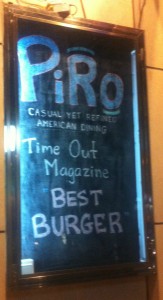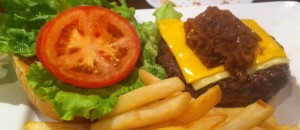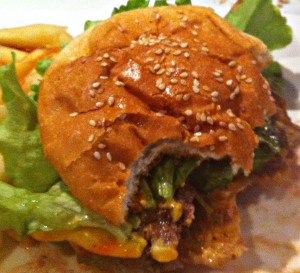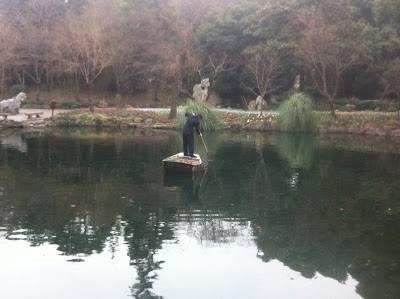For the first time in years, I didn't have plans for New Years Eve. As of 4PM on December 31, my only plan was to get some sushi and sake with Serge (one of the roomies), and we would see where the night took us from there. A few days earlier, the realization that my first New Years in Shanghai would be essentially without a concrete plan of action was somewhat discouraging. But by the day of, I had decided that the best way to enjoy New Years in Shanghai was to do exactly what Serge and I were going to do: have dinner, have a few drinks, and go hit the streets in search of unplanned fun.
That would change, very quickly indeed.
At dinner with Serge, the topic of conversation ranged, naturally for two fairly introspective people on New Years, from reminiscing about the past year to looking forward to the coming one. At one point, we deviated from such deep discussion, and started discussing our long put-off plan to go to Macau. He's been, many times, and has wanted to take me there pretty much since we've known each other. It's only a 2.5 hour flight down from Shanghai, and you can get there relatively cheaply because there are three cities within easy striking distance (Hong Kong, across the bay, and Shenzhen and Zhuhai on the Chinese side of the border). At one point, after a particularly rousing gulp of sake, one of us said to the other one, "You know...we could just go tonight."
By 7am on the next morning (January 1), we were on a plane. To go through the sequence of ridiculous events that led from the Japanese restaurant in downtown Shanghai to a China Eastern flight bound for Zhuhai would be to do a disservice to the sheer absurdity and spontaneity of the decision to go. Suffice it to say, it included not just one, but two trips to Hongqiao Airport in the span of five hours (the first one to demand that they let us on the next flight to Macau, Hong Kong, or Zhuhai, only to discover that the entire airport had shut down for the evening).
24 hours after landing in Zhuhai, we were back in Shanghai, home from a 36 hour extension of New Years that I will never forget (save for the parts I, well, can't remember). Now, objectively speaking, taking a last minute trip to Macau was, for a number of reasons, not the wisest of choices. Primarily, it was expensive, something that obviously didn't matter to us at the time. We also didn't sleep much at all, which dampened the tourist spirit somewhat. But that's all besides the point. I am not a very spontaneous person. I'm about as risk-averse as it comes (except, I suppose, when it comes to gambling, which I have been known to do on occasion. Such as last night, for example. Don't worry. Everything in moderation). So to have an experience such as a random jaunt to Macau was to prove to myself, to a certain extent, that I too can be spontaneous and do crazy things just for the sake of doing them. That in and of itself was exciting enough to warrant the trip.
There are moments and experiences in life, both good and bad, that keep us on our toes, and that suggest to us that regardless of what happens, life always has the potential for surprising us. The 36 hour span from the Japanese restaurant on Monday night to Pudong Airport arriving home on Wednesday afternoon certainly qualify as one of those periods.
If I have any regrets, it is that I did not capture enough of the trip with pictures. The ones below are the ones I have, and will therefore have to do.
Certainly not the most flattering photo of either me or Serge, but it does justice to the absurdity of the situation: Hongqiao Airport in Shanghai, with dawn just settling in on New Years Day, and the realization that we were on our way to Macau similarly dawning on us.
I was expecting Macau to be a Vegas of the East -- glitz and glamour, lights and spectacle, with no real culture or history to speak of. I was wrong. Behind the facade formed by the many casinos along the waterfront is a network of winding narrow streets, and old Portuguese architecture. Much of the city looks like a combination of Miami and New Orleans, and on streets like this one, you would never know that you were in a city that has recently outstripped Las Vegas in terms of
gambling revenue.
Of course, if it's the neon wonderland of massive casino/hotel/entertainment megaplexes that you seek, Macau will satisfy these cravings as well. In the foreground sits the Wynn, on the water, with the monstrous and (in my opinion) hideous Grand Lisboa in the background providing the only real skyline to speak of in Macau.
Macau Tower overlooking the two manmade lakes that separate Macau Peninsula from the South China Sea.
At night, the Grand Lisboa really gets going. As if the structure wasn't ugly enough, it starts emulating an erupting volcano in lights.
In an obvious homage to Vegas water shows, particularly the one at the Bellagio, the Wynn hotel has an hourly water show in front of the casino. It's not as impressive as the one in Vegas, though the flamethrowers do add a certain pizzazz.
We went on a late night pilgrimage to the ruins of the St. Paul's Cathedral, a 500 year old church that was almost entirely destroyed by a typhoon that hit Macau in 1835. All that remains is the facade (there is just a garden, no church, behind what you can see in these pictures).
And one final look at the Lisboa, at the witching hour, which has turned from fiery reds and oranges to more of an aquatic theme, watching over a sleepy evening in Macau.































